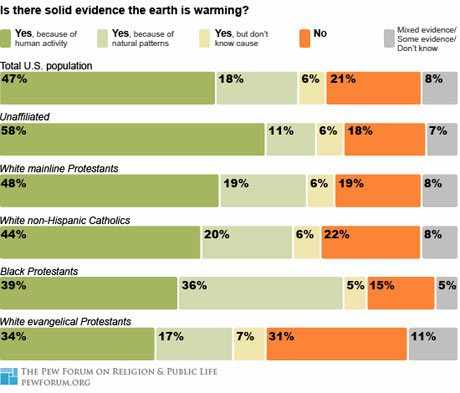A poll this week showed that only 34% of America's white evangelical Protestants accepted there is solid evidence that global warming is real and that it is attributable to humans
- guardian.co.uk, Friday 17 April 2009 14.58 BST

Graphic: Pew Forum on Religion & Public Life
Just what is it with evangelical Christians and global warming? I doubt we're ever going to get a satisfying answer to this long-running question, but it is being raised yet again by the publication yesterday of a survey by the Pew Forum on Religion & Public Life.
The poll canvassed views on climate change among the "major religious traditions" in the US. Surprise, surprise, it shows that "white evangelical Protestants" were the group with the lowest level – 34% of those surveyed – of acceptance that there is solid evidence that global warming is real and that it is attributable to humans. This compares with 47% of the total US population (still startlingly low), and 58% of those surveyed who "had faith" but who were unaffiliated to any particular religious tradition.
It would have been interesting to have seen the stats for Jews, Muslims, Hindus, Buddhists, and any of the other "major religious traditions", but the Pew Forum said that out of the 1,502 American adults it surveyed the sample sizes were too small for the data to be worth reporting. But with 76% of Americans claiming to be Christians, perhaps this isn't much of a surprise.
All religious groups have their charismatic leaders, but US evangelicals – who some claim to number up to 100 million people – probably know better than any other group how to get their message across loud and clear to their followers with their syndicated radio stations, TV channels, megachurches and sophisticated online activism.
Some of these leaders display a particular sort of venom towards the "global warming agenda". Others, however, have appeared in recent years to start speaking up the need to adopt environmentalism – or "creation care", as it is more popularly known – and wrapped up within all this is an acceptance that global warming is a reality and needs tackling.
The division between these stark viewpoints has led to some public bust-ups between leading evangelicals – but the facts remain, as the Pew Forum survey indicates, that many evangelicals have little time for talk of global warming.
Last year, there was even an attempt by some leaders to talk up the need for "creation care", but to dampen concern for global warming. The "We Get It!" campaign's declaration is something to behold:
God created everything. He made us in His own image, and commanded us to be fruitful and multiply and watch over His creation. Although separated from God by our sin, we are lovingly restored through Jesus Christ, and take responsibility for being good stewards. Our stewardship of creation must be based on Biblical principles and factual evidence. We face important environmental challenges, but must be cautious of claims that our planet is in peril from speculative dangers like man-made global warming. With billions suffering in poverty, environmental policies must not further oppress the world's poor by denying them basic needs. Instead, we must help people fulfill their God-given potential as producers and stewards. We will follow our Lord Jesus Christ and honor God as we use and share the principles of His Word to care for the poor and tend His creation.
I have always been intrigued about how Christians square the whole "be fruitful, and multiply, and replenish the earth, and subdue it, and have dominion…over every living animal that moveth upon the earth" thing from Genesis 1:28 with "creation care" – something I put to the Bishop of London in an interview a couple of years ago.
But I think the We Get It! declaration makes better sense when you learn that it is backed by the Family Research Council and its spokesperson Tony Perkins (no, not the one in Psycho – I think) who says that "we cannot justify policies that make food and energy more expensive on the grounds that we're fighting against an environmental threat that is at best speculative". (Head over to the "issues" page of the Family Research Council for a sample of its other viewpoints – its views on homosexuality are pretty enlightening.)
Another key supporter of the We Get It! Campaign is the Cornwall Alliance which, since its creation in 2000, has been doing its best to whip up the fires of scepticism about global warming. (It does claim to have supporters from other faiths and denominations, but it is a predominately evangelical organisation.) Again, it's worth reading over its views in detail yourself, but here's a little taster:
Many people mistakenly view humans as principally consumers and polluters rather than producers and stewards. Consequently, they ignore our potential, as bearers of God's image, to add to the earth's abundance… Our position, informed by revelation and confirmed by reason and experience, views human stewardship that unlocks the potential in creation for all the earth's inhabitants as good. Humanity alone of all the created order is capable of developing other resources and can thus enrich creation, so it can properly be said that the human person is the most valuable resource on earth… While some environmental concerns are well founded and serious, others are without foundation or greatly exaggerated… Some unfounded or undue concerns include fears of destructive manmade global warming, overpopulation, and rampant species loss.
It's a popular rebuke made by climate change sceptics that environmentalism displays all the traits of a religion (the words "pot", "kettle" and "black", spring to mind for some reason), but I have to say I'm left perplexed when I even attempt to understand the logic of creation care through the prism of evangelicalism.
Many millions of people hold these views so it would be foolish to ignore this huge constituency, but how do you even go about responding to such beliefs?

No comments:
Post a Comment